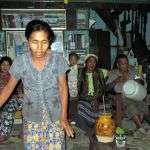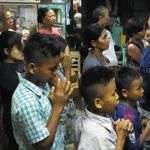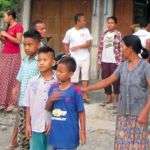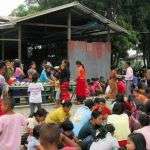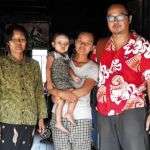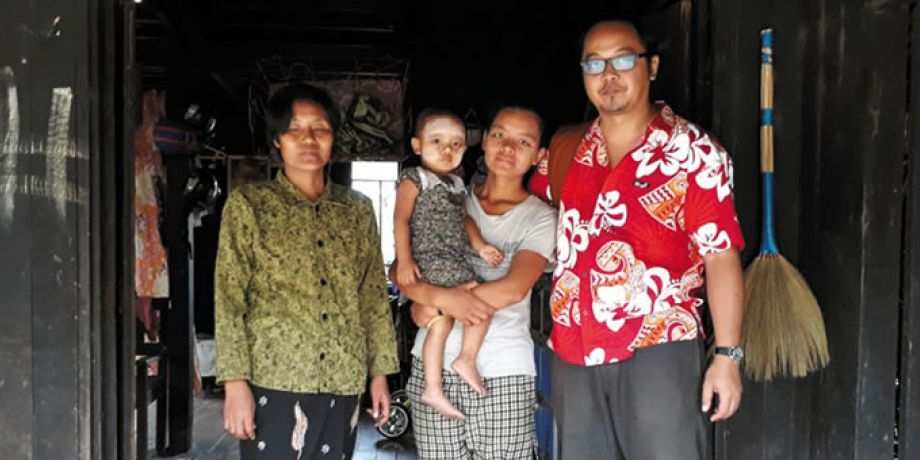
Good News in Myanmar
I wonder what the first Easter was like. How did the disciples feel about losing their teacher and friend and then realizing the truth of His resurrection? What was the first Easter like for them? It must have been a very exciting day–different from any other day! Just three days ago Christ Jesus was dead and now He was among them. He was raised to life. In the Gospel, John describes the deep sorrow of the disciples which was turned into deep joy. Jesus told His disciples, "For a little while you won't see me, but after a while you will see me" (John 16:16). Then, they were filled with joy, because they did see Jesus again! He appeared to them three days after He was buried. Easter is our Good News!
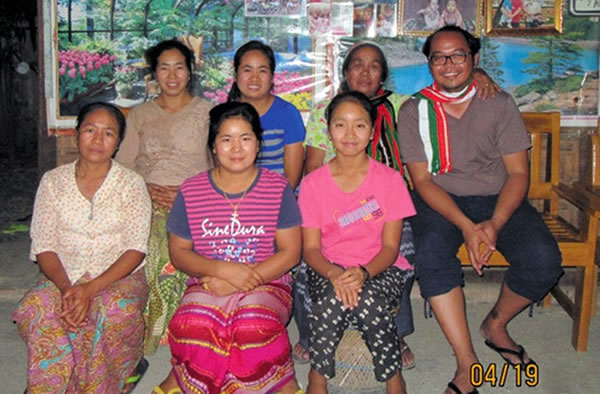
Long before coming to Myanmar, I was introduced by a friend to her classmate who comes from Myanmar. So a few days after arriving here, I contacted him and arranged to meet him after Mass in St. Mary's Cathedral. I decided to wear my longyi on that day, and eventually when we met, he was surprised to see me in their traditional wear. He invited me to come visit him in Kalaymyo during the Thingyan holidays, and I agreed. And there I was on Easter weekend and three more days. I arrived in Kalaymyo which lies northwest of Myanmar. It belongs to the Sagaing Division but most of the population belong to the Chin tribe. Their registration name is Chin, but they call themselves Zomi people with their own distinct language and culture.
I arrived in Kalaymyo on Black Saturday. Anthony's brother Michael picked me up from the airport. He is the youth leader of the diocese and volunteers most of the time with church work. Through him, I was invited by the parish priest to join him for Easter Vigil. After dinner we went straight to the church. People expected that things would start to move by 9:00 pm, but it was already quarter to nine with two long lines of people waiting to in line for confession. Eventually we started after 30 minutes. Everything went dark except for the charcoal of fire. Then the parish priest started the lighting of the Easter candle. Slowly the crowd followed as we walked into the church. Solemnly, everyone walked following the priest.
On the same day, Anthony's family invited me to dinner. He told me they wanted to meet me. One family member was Anthony's Aunt Rosa who speaks Tidim but very little Burmese or English, and she kept repeating to me, "Good, good, good. I am sorry!" Michael told me she wanted to talk to me but she does not know how in English. Around 5:00 pm people started coming in and I was introduced to each family member. Anthony has a big family. Like Filipinos, families are extended to the brothers and sisters of one's parents on both sides and their families. It was just like being at home. The youngest is little Francis, the adorable baby. Anthony and his family belong to the Zomi peoples specifically the Tidim group. They speak a unique language and possess a culture similar to the neighboring hill tribes of India, the Naga people and northern Myanmar, Kachins.
Then they offered me a local and traditional wine made from rice. It was placed in a jar and one has to sip through a bamboo straw. They told me after I sip I should pour water to the jar. Then anyone else can sip from the jar too. It can last the whole night and it will just become sweeter and better. I think I just discovered the miracle of the water turning into wine!
The family gathers annually for Easter. And on this special night probably like the night the disciples were gathered, the family began to pray. They sang one Zomi hymn, followed by the Gospel reading, and then they asked me to give the final blessing. It was amazing to be among them. It felt like watching what early Christians could be doing – a household church truly alive! A joyful sight to watch.
What followed after was even more joyful. There was so much laughter even if I did not understand much what they were saying and they could not probably understand much of my Burmese I was attempting to say.
After the prayer everyone gathered. One uncle started to improvise and play the drum on an empty water jug. Spontaneously, everyone began singing led by the eldest lady in the house, Auntie Rosa who by now I fondly call, "Auntie Good Good Good." Anthony explains some of the words of the many songs to me:
We can not say or talk much but what we cannot say we can sing to you.
In the beginning, we never know each other.
It is because of God that we now know each other.
We are happy you came. We see you like a sibling – a brother.
We are happy we have the same color. You are like one of us.
Singing is empty without dancing.
Auntie "Good Good Good" would break into dance as soon as the drum beats started. Then she asked me to stand and dance with her, and everyone else stood and danced with us, too. This is Easter! Alleluia. Alleluia. Jesus is alive!
I was so overwhelmed by what happened the night before that I decided to cook for the family. I thought five to eight people would be manageable, but it turns out most of the people that came last night were coming for dinner. So I asked Michael to accompany me to the market to buy the ingredients. I prepared sinigang, or pork sour soup and fried vegetables. I was a little anxious how the food would turn out. They were quite generous with their praise, and said that it was tasty.
The following day together with Michael and six other family members we travelled on motorbikes for three hours to reach the border of India, the town of Tamu on the Myanmar side and the town of Moreh on the Indian side. On the way back, we dropped by a huge dam project and stopped at the Tropic of Cancer marker. It was a very exciting experience to cross the border to India. How I entered India is another story!
I finally met Bishop Felix one night. I was given a room just across from his. He is a young and energetic bishop. That night I came from Anthony's place in my Kachin batso (longyi) and holding a Buddhist monk's bag. He laughed looking at me and so I explained this is what I call interfaith dialogue. I spent some time with him after and also thanked him for allowing me to stay with them. Fr. Titus also gave me opportunities to say Mass with him at the parish church, and even invited me to say a brief reflection just before he was going to read the Gospel. Good thing I had some coffee before Mass!
If you wonder what my first Easter was like in my new home, it was just like the Easter of the first disciples. A very exciting and hopeful day – a day quite different from any other day. I was filled with joy the entire week I was in Kalaymyo – that joy and feeling of being home, being yourself.
I thanked everyone I met for their generosity and welcoming heart. I promised Auntie Rosa "Good, Good, Good" that before I left I would drop by her house and say goodbye. So I did and she gave me a gift, a traditional scarf she weaved herself and asked me to return to visit them again.
And so that was my first Easter in Myanmar – it was an Easter I will never forget!
Columban Fr. Kurt Zion Pala lives and works in Myanmar.
